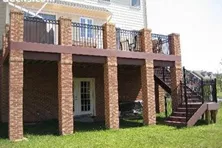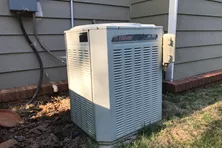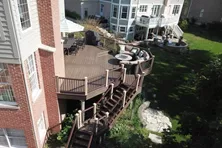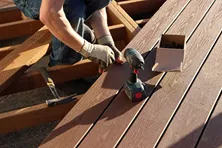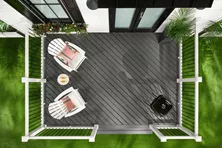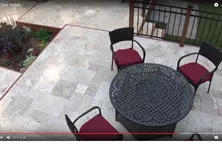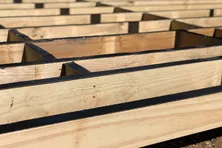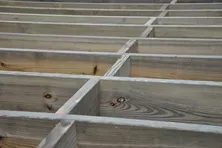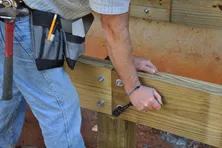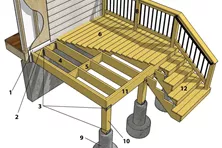How to Design & Build an Above-Ground Pool Deck

Adding a deck to your above-ground pool can make a world of difference, offering improved aesthetics, easier access, a better view into the pool, and a place to sit back and relax.
However, designing and building an above-ground pool deck differs from constructing a regular deck. With some forward-thinking and special considerations, you can make informed decisions on materials, layout, safety features, and maintenance practices that will enhance both your outdoor space and pool experience.

How to Build an Above-Ground Pool
Building an above-ground pool is a multi-stage process. Here are the steps to follow to ensure your design comes to life problem-free.
Planning & Design
In the initial stage of design and planning, consider both the intended deck and the above-ground pool design. You’ll need to figure out the size and shape of both the pool and the deck. The goal is to create a finished project that is ideal for your enjoyment and works in your available space. Once you have a clear idea, compare it to your local building codes to ensure compliance with all requirements. Continuously updating versions of your design will help you maximize both enjoyment and safety in your final deck layout.
Permitting
With your final design in hand, you can check with your local building authority for approval. During this stage, a professional will review your design to ensure it meets all relevant building codes. This review will cover construction design, building techniques, materials, and safety features. Permitting requirements vary by location, so it’s important to get advice during the design, planning, and permitting stages to ensure a safe and compliant final project.
Site Preparation
The first stage of constructing an above-ground pool deck is to prepare the ground as you’ll need a stable and graded surface. Start by removing any obstructions such as grass, plants, shrubs, and existing structures. Once the area is cleared, check and adjust the surface to ensure it's stable. Proper preparation prevents the ground from settling, which could cause the pool to shift away from the deck. At times, you may need to add fill material to reinforce the ground.
To ensure your pool is as level as possible, start by selecting a site that is already close to level, reducing the need for extensive digging. Be mindful of maintaining the correct distance from property lines, as specified by local setback regulations. If your property features a slope, first evaluate its degree to decide whether machinery or manual digging is necessary. For steeper slopes, excavation equipment might be required. Seek out the most level area on your property to minimize the excavation needed to create a stable foundation for your pool.
Setting the Footings
Begin by marking the locations of each vertical post. Then, dig the holes for the footings according to your design specifications, making sure they reach the required depth. You can then pour the concrete footings. If you’re using post anchors that need to be set into wet concrete, install them at this stage. But if you're using anchors that can be fitted later, you can drill and install them once the concrete has fully cured.

Installing the Frame
Once the footings and post anchors are complete, install the support posts, ensuring they are aligned at the correct height; trim them as necessary. Then, attach the beams to the posts to create the main deck frame. Install the joists across the beams, spacing them according to your deck frame design. After the joists are in place, add cross-bracing to the frame to improve lateral stability and ensure the deck remains sturdy. To connect the deck frame, use a combination of bolts, screws, and hangers, as specified in your design and approved by local codes. Adhering to your construction plan is crucial for constructing a sturdy and freestanding frame, ensuring durability for years.
Laying the Deck
Install the decking boards perpendicular to the joists, leaving a small gap between the boards to allow for expansion and drainage. Secure the boards to the joists using visible deck screws or hidden fasteners, ensuring that each board is firmly fixed in place. Finally, trim any excess decking that goes beyond the frame to achieve a clean, finished edge.

Installing Railings, Stairs, & Gates
Attach railings around the deck’s perimeter for safety, ensuring they meet the local building code height requirements. Construct stairs leading up to the deck that are sturdy and comply with code requirements for tread depth and riser height. Finally, install a gate to secure the area.
What to Consider When Designing an Above-Ground Pool Deck
Before you decide whether to DIY or hire a professional to draft a plan for your above-ground pool deck, consider the following points:
Above-Ground Pool Deck Building Tips
Align the Deck with the Pool Coping/Edging: Ensure the top edge of the pool coping is aligned just above the height of the deck boards. This alignment allows the deck to seamlessly flow with the pool, avoiding unsightly gaps.
Check Building Code Requirements: Verify specific height allowances between the pool coping and deck, as well as regulations for slope, anti-slip measures, walkway width, gate, and railing requirements. Sticking to these codes ensures your deck is safe and compliant.
Confirm Footing Requirements: Local codes may vary when it comes to footing requirements. Check these requirements before beginning construction.
Consider Decking Around a Curved Pool: Building a deck around a curved pool means additional planning for a frame to support the deck board overhang. You can expect an increase in both material and labor costs.
Take Advice: Adding a deck to your above-ground pool is a huge undertaking and should be approached with careful consideration. Take advice from professionals for inspiration and technical guidance to discover the best tips for installing an above-ground pool.

Should you hire a professional deck builder or DIY?
Choosing whether to tackle the construction of an above-ground pool deck yourself or hire a professional contractor can seriously impact the outcome of your project. Here are some factors to consider:
- Skill Level: If you have advanced skills, you might handle the project yourself, but hiring a contractor could enable you to construct a more complex and professionally finished deck.
- Tools & Equipment: If you choose a DIY approach, you'll need to either purchase or rent equipment (and know how to use it!) such as cement mixers, power saws, drills, and levels.
- Knowledge and Know-How: Professional contractors bring years of knowledge and experience to deck construction to efficiently manage the project and address any issues that arise. For DIY enthusiasts, unexpected problems could mean delays, higher costs, and a less polished final result.
- Time Scale: Depending on your availability and skill level, a DIY project could take a while to complete. However, a team of professionals can finish the project faster and with fewer disruptions to your schedule.
- Work Guarantee: Professional contractors often offer warranties or guarantees on their work. These cover issues that may arise after installation that they bear the cost of fixing. With a DIY project, any issues that arise will be your responsibility.
Install your pool before you build your deck
Having your pool installed before you start constructing your deck can save a lot of headaches and extra work. Even though above-ground pools are “standard” sizes, there is always some variation. This means adding the pool after the deck has been built could result in a pool that is in fact either too big or too small to fit in the opening you have created.

Budget for fencing around your pool
Installing a fence is essential for safety in any yard with a pool. Requirements for pool fences, including height and design, differ by state and municipality. Before starting your project, confirm that your fence plans meet local building codes and ensure a portion of your budget is set aside for railing and gate accessories.

Build your deck as close to your pool as possible
When designing and installing your above-ground pool deck, your goal is to position the deck as close to the pool as possible. This approach helps eliminate gaps that could pose safety risks. Even a small space between the pool and deck can create a trip or fall hazard for anyone entering or exiting the pool or those simply enjoying the deck area. Ensuring a snug fit will improve safety and provide a more seamless transition between the pool and deck.
Above-Ground Pool Deck Maintenance
Proper maintenance of your above-ground pool deck is crucial for durability and safety, especially given the diverse range of materials available. Here’s how to care for different deck surfaces, including concrete, precast cement pavers, wood, and composite materials.
Concrete Patio Maintenance
To maintain a patio made out of concrete, regular cleaning is essential to prevent the buildup of algae and dirt, which can make the surface slippery. A pressure wash every season can help keep it looking fresh. While concrete is robust, it can develop cracks over time, especially in areas with significant temperature fluctuations. Promptly filling any cracks can prevent further damage.
- Regular cleaning to prevent algae and dirt buildup.
- Seasonal pressure washing for freshness.
- Promptly fill cracks to prevent further damage.
- Monitor for temperature-related cracking.

Precast Cement Paver Maintenance
Precast cement pavers offer aesthetic flexibility with various shapes and color options. They require a stable foundation to prevent sinking, which can lead to an uneven surface. Leveling is necessary to maintain a smooth surface, however, this can create low areas that allow water to pool and lead to significant damage. Like concrete, precast pavers benefit from regular cleaning to avoid stains and maintain their visual appeal. Sealing the pavers can enhance their durability and resistance to weather conditions.
- Ensure a stable foundation to avoid sinking.
- Regular inspections and leveling for an even surface.
- Clean regularly to prevent stains.
- Seal pavers for enhanced durability and weather resistance.
Wood Decking Maintenance
Wooden decks, whether made from cedar, pine, or hardwood, need consistent upkeep to combat wear and tear from weather and pool water. This includes staining, sealing, and regular cleaning to prevent rot and insect damage. Sweeping off debris and washing with a mild detergent will help keep the wood in good condition.
- Consistent upkeep with staining and sealing.
- Regular cleaning to prevent rot and insect damage.
- Sweep debris and wash with mild detergent.

Composite Decking Maintenance
Composite decking is known for its low maintenance requirements. Simple periodic cleaning with soapy water and a brush is generally sufficient to maintain its appearance. It's resistant to fading and staining, which makes it a long-lasting option for poolside areas. The installation process is also simpler than materials like cement, as a level surface is not required for construction. This also means that water will naturally run off the area, ensuring it doesn't accumulate and cause damage.
- Low maintenance with periodic cleaning using soapy water.
- Resistant to fading and staining.
- Simple maintenance keeps it long-lasting and visually appealing.
It's important to note that wood decking requires significantly more maintenance compared to composite decking and other materials. Regular cleaning is essential to prevent stains and damage from fallen debris. Unlike composite decking, which only requires occasional sweeping and an annual wash, wood decking often needs more frequent care. Stains and stubborn marks on wood need to be tackled with a stiff brush or a power washer, and this cleaning should be part of a continual maintenance routine.
Additionally, wood decks require annual re-staining to maintain their appearance and protect against weather and insect damage. This process involves cleaning, sanding to ensure proper stain adhesion, and applying one or more coats of stain. Over time, wood is also more susceptible to weathering, rot, and insect damage, often necessitating repairs or replacements. In contrast, composite decking's resistance to these issues means it does not require staining or sealing, offering a durable and low-maintenance alternative with a consistent appearance year after year.

Above-Ground Pool Deck Material Options
When selecting the specific material for your deck, the main options available are composite and wood. Here is a closer look at how these materials compare.
Composite Decking:
- Benefits: Known for its low maintenance, composite decking resists fading, staining, and moisture damage, providing a consistent appearance over many years. It is available in various colors and finishes for aesthetic versatility.
- Costs: While composite materials have a higher initial cost, their durability and minimal maintenance can lead to lower long-term expenses.
- Maintenance: Simple periodic cleaning with soapy water is usually sufficient, making it a hassle-free option for pool owners looking for longevity with minimal effort.
Wood Decking:
- Benefits: Wood provides a classic, natural look that can be customized with different stains and finishes. It's generally more budget-friendly initially.
- Costs: While the upfront cost might be lower, wood requires ongoing maintenance, which can add to long-term expenses.
- Maintenance: Requires regular staining, sealing, and cleaning to prevent rot and insect damage. Wood can also warp or splinter if not properly maintained.

Run decking boards beneath your pool rails
Unless you are using pavers, your decking should extend below the rails of your pool. This approach ensures that if maintenance or repairs are needed for the pool or pool liner, you won't have to cut into or dismantle the deck. Discussing this with your pool installer during the deck planning stage can help prevent bigger problems down the line.
Build a separate structure to house your pool equipment
Your pool comes with an essential filtration system. For easy access and proper ventilation for the equipment and servicing, place these systems in a structure close to your decking. Avoid placing the equipment under the deck, where access can be challenging and airflow may be restricted.

Get Started with Above-Ground Pool Deck Plans
Adding a deck to your above-ground pool will elevate your outdoor living experience, creating a space to relax and enjoy with family and friends.
With careful planning and research, you can design a deck that maximizes your available space. Consider different pool shapes and decking materials, and consult with knowledgeable deck builders to create the perfect spot for everyone to enjoy.
Check out our free pool deck plans and begin designing your ideal above-ground pool deck today
How to Decorate Deck Support Columns
Browse some examples of decorative deck support posts for tall decks.
Building A Deck Over An Air Conditioner
Things to consider when building a deck near an air conditioning unit. You may want to relocate the AC unit if possible to avoid some problems.
Deck Joist Cantilever & Overhang Rules
Learn what factors determine the maximum joist cantilever overhang that is allowed.
How to Install Decking Over Existing Concrete Slab, Patio, or Porch
Discover the best techniques to build a deck over concrete, ensuring proper drainage and stability, while creating a beautiful outdoor space.
Best Time to Build a Deck
People often wonder when the best time to build a deck is. Learn why building a deck in winter or fall might be your best bet.
Tile decking
Installing tile over a standard deck frame in an exterior environment is a recipe for trouble.
More Helpful Resources
Explore Articles by Topic
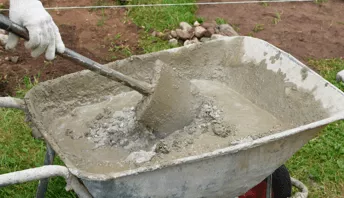
Footings
Information related to installing frost footings for decks
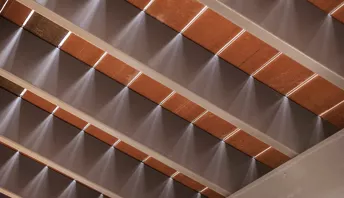
Framing
Learn structural framing methods
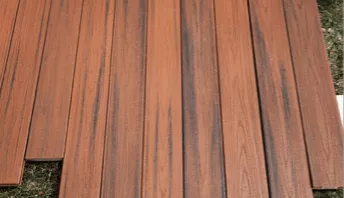
Decking
Learn about wood and composite decking materials
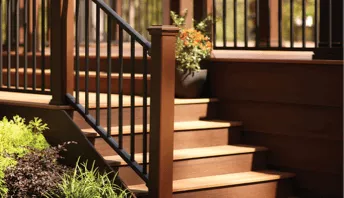
Stairs
An in-depth look at the complex issue of how to build stairs
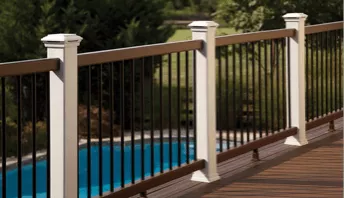
Railings
How to install guardrails and handrails to meet IRC code
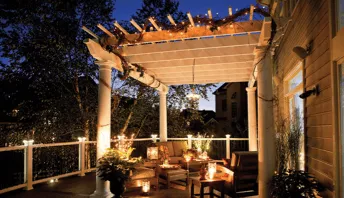
Features
An overview on water drainage, benches, planters and lights
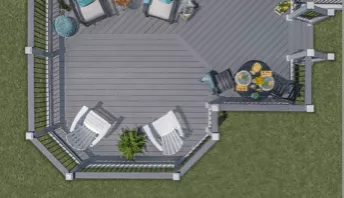
Design
The basics of deck design
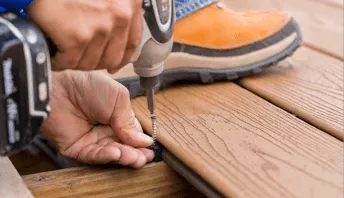
Planning
Learn about permits and working with contractors
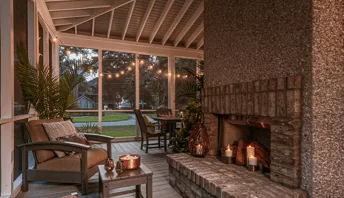
Porches & Patios
Build a covered deck to enjoy all seasons
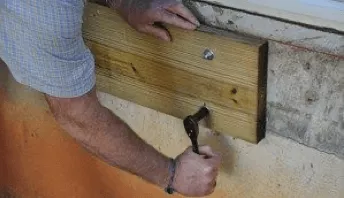
Ledger
Proper attachment techniques
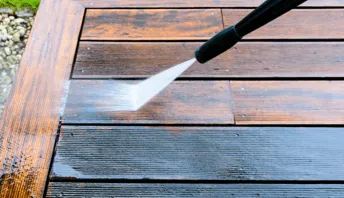
Care
Maintain your deck to maintain your investment

Materials
An overview on water drainage, benches, planters and lights
Why is Joist Protection so Important for Your Deck?
If you’ve ever seen a piece of wood left out in the weather for any period of time, you know what happens: decay. Whether through wet rot, insect damage, or mildew, the fibers begin to break down.
Reinforcing Deck Rim or Band Joists
Learn a technique to strengthen your guard rails by installing a double rim joist and adding structural blocking to reduce bounce.
How to Create Strong Post-to-Beam Connections
Learn how to create a positive structural connection for your post to beam connections. Use lag bolts, through bolts with washers, support cleats and hardware connectors.
What to Consider When Building A Wrap-Around Deck
Looking to add a wrap-around deck to your home but unsure of what the process involves? Check out this guide to learn more about top considerations when building a wrap-around deck.
Anatomy of a Deck
A comprehensive guide to help you learn the names and understand the functions of every part of your deck.
Hidden Deck Fastening: 3 Ways to Fasten Your Composite Deck Boards
Hidden deck fasteners are the ideal option for DIY builders looking to hide their hardware, without sacrificing the stability of their deck. From nearly invisible deck plugs to color-matched deck screws, knowing how to choose and install these hidden fasteners is an easy way to level-up your deck project.
Explore Articles by Topic

Footings
Information related to installing frost footings for decks

Framing
Learn structural framing methods

Decking
Learn about wood and composite decking materials

Stairs
An in-depth look at the complex issue of how to build stairs

Railings
How to install guardrails and handrails to meet IRC code

Features
An overview on water drainage, benches, planters and lights

Design
The basics of deck design

Planning
Learn about permits and working with contractors

Porches & Patios
Build a covered deck to enjoy all seasons

Ledger
Proper attachment techniques

Care
Maintain your deck to maintain your investment

Materials
An overview on water drainage, benches, planters and lights





